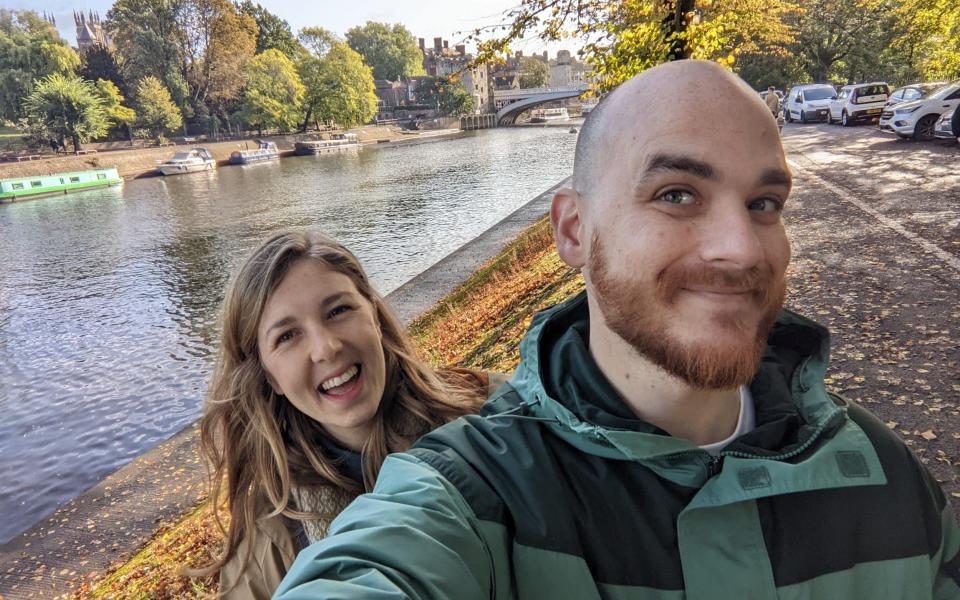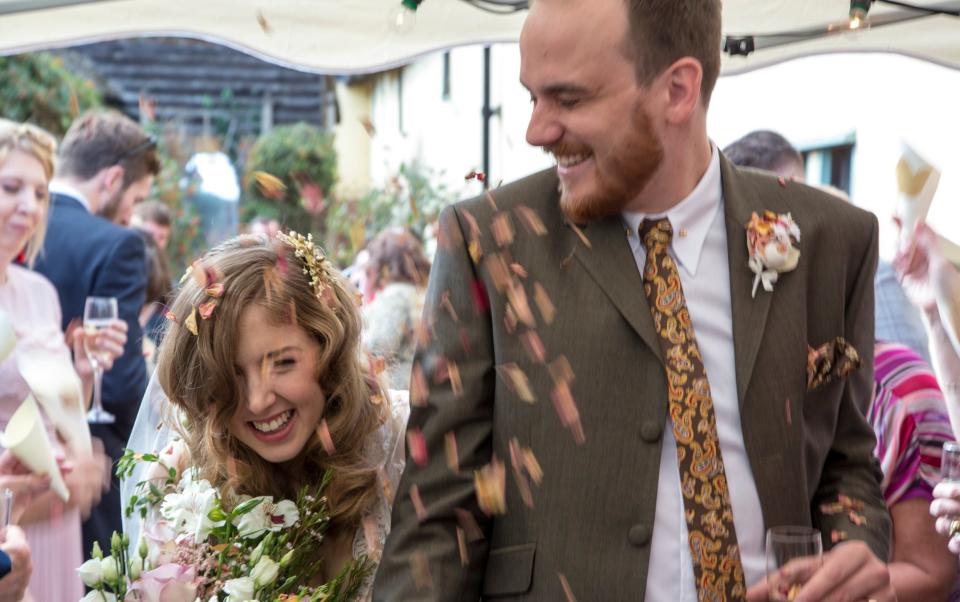Telegraph readers raise over £30,000 for Jon Chapple's cancer treatment after he was failed by NHS

Allison Pearson on Tuesday wrote how the NHS failed Jon Chapple, 34, whose diagnosis of incurable bowel cancer was delayed because the NHS turned into a “Covid-only service.” Jon is now dependent on “the kindness of strangers” and is crowdfunding to have a revolutionary cancer vaccine in Germany.
Since the publication of Ms Pearson’s article, Telegraph readers have managed to contribute £30,000 to help with Jon’s cancer treatment, surpassing his original £75,000 target to reach a total of £108,000.
In response to the incredible generosity of our readers and all those who have donated, Jon said: “I’m supposedly a writer, but I am struggling to find the words. I’m just overwhelmed. The generosity of people is unbelievable, and I know it’s a cliche but it has rather restored my faith in humanity after being so badly let down earlier on.
“Aside from the money, the donors have given me a gift that’s completely priceless: hope. Even compared to a week ago, I’m feeling so much more positive about the future and for that I can’t thank them enough.
“So, from the bottom of my heart, thank you. I hope to be able to pay it forward someday.”

Upon reading Jon’s story, Telegraph readers have detailed their own experiences of being treated by the NHS throughout the pandemic.
While some have received “timely and exemplary treatment”, others shared how they and their loved ones have too been failed by the system.
Below, we share a selection of their own cases:
‘I’m alive, pretty much thanks to my own efforts’
Telegraph reader Penelope Simpson’s case was one of survival purely based on her financial status, “bloody-minded determination to live” and her “ability to fight back against a system content to condemn you to death”.
Attending the results of a biopsy alone, where Ms Simpson was “forced to stand with about thirty others as apparently chairs would spread Covid”, the first thing the consultant said to her was ”pull your mask further up your nose. There is a pandemic”.
The eight-minute life-changing consultation culminated in the consultant informing Ms Simpson that although surgery should be done within two weeks, it was unlikely to be before May – and it was November at the time.
Ms Simpson said there was “no sorry, no explanation. Dismissed and could I send the next person in”.
She drove home “shaking with anger” and phoned BUPA, “who saved my life”.
“I eventually got my surgery three days after the biopsy diagnosis, but only because I was prepared to pay. I had BUPA coverage but had never expected to have to use it for cancer. The chaos was such that I did not know until 20:00 the night before where surgery would take place. Eventually I was scheduled at the BMI Bournemouth which appeared to be totally empty”, recalled Penelope.
Penelope later developed a seroma, “which is basically a fluid bulb that was bigger than my remaining breast”. Alarmed at the red stain spreading across her body, Penelope’s friend telephoned the local surgery. She was told to draw a felt tip pen around the stain and to ring back if the infection had spread.
“In one hour it covered my torso and my friend called the surgery in alarm as I put my breast up to a camera so that the GP wouldn’t have the inconvenience of visiting a patient. Utterly humiliating.
“Nobody would come out, and eventually it was agreed that I should go there. It was a cold winter’s evening, I was a 70-year-old woman just released from major surgery and I had to stand outside the door of the surgery trying to persuade the receptionist to let me in. I shall never forget yelling ‘I’ve got breast cancer’ before the door was opened.”
After the GP diagnosed that Ms Simpson was going into septicaemia, she was admitted to hospital.
“I can remember her on the phone begging local hospitals, ‘well somebody’s got to take her.’”
Penelope thankfully recovered. She said: “I saw the oncologist, who told me that NHS guidelines stipulated that chemotherapy should commence no more than six weeks after surgery. It was January, and he told me it would be August before I could be treated.
“I threw a tantrum, used my verbal skills to berate the system, and eventually got them to bring it forward to March. I won the battle but I went home weakened by having to threaten and berate in order to get treatment.”
To this day, Penelope is “sickened” and although her oncologist had been helpful, “there is no rapport and absolutely no care. I have had to fight every step of the way.”
So, where is Penelope Simpson now?
“Well, I’m alive, pretty much thanks to my own efforts, supportive friends and wonderful BUPA. But, I have late stage aggressive cancer which should have been caught much earlier if mammograms had not been stopped.
“The NHS is a communist-style system operating in a capitalist country. Like all monopolies, it has no accountability and therefore is left to continue in a downward spiral.
“I am happy to pay for my own health care as should anybody with the means to do so, but it is outrageous that I also have to pay for a national system that is nothing short of a disgrace.”
‘My mother has MND – it took over a year for the neurology clinic to contact her for an initial discussion’
“The NHS is an appalling service”, reader Michael Thompson began as he shared how his mother received inadequate care for motor neurone disease.
Mr Thompson’s mother developed symptoms in January 2020, but it took over a year for the neurology clinic to contact her for an initial discussion, and “as it took so long, my mum was forced to go private initially,” he said.
He could not believe “the GP surgery didn’t have a process to flag up and act upon receiving a consultant’s letter that someone is terminally ill,” and branded the NHS “a completely useless system from an administration perspective.”
There was no initiative to try new treatments for his mother’s condition and no real interest in the ongoing research or trials, “they basically say nothing has ever worked so don’t bother. Frankly, a go away and die attitude,” Mr Thompson despaired.
He described it as “frustratingly maddening” that even now after the pandemic is over, there are “two specific nurses at the clinic for what can’t be more than 100 or so patients, seen once every three months or so. They never send appointments out, no follow up of patients by those nurses. No idea what they do all day as they’re not on a ward.”
‘If a doctor had seen her they would, I hope, have realised the weight loss was trouble’
Carol Scott lost her closest friend 18 months ago to lung cancer. Ms Scott explained her friend was “unable to see a doctor and just prescribed antibiotics over the phone.”
Finally, her severe weight loss made her son take her to hospital, he had not seen her for a while due to lockdowns. She was diagnosed with stage 4 lung cancer and died two months later. Incidentally, she was never a smoker.
“I am still furious about my friend. If a doctor had seen her they would, I hope, have realised the weight loss was trouble. Family being told to keep away meant they didn’t see her for a while, too.”
‘My son died in June 2021 because the telephone doctor failed to diagnose pancreatitis’
In another heart wrenching case, reader Anthony Wands shares how he lost his son, Jeremy, in June 2021 “because the telephone doctor failed to diagnose pancreatitis.”
Anthony explained how Jeremy was “palmed off with ‘stomach upset’ for nausea and ‘back strain’ for searing pain in his back.”
Anthony’s late son was tragically found dead on the bathroom floor, aged only 32.
‘No one is ever made to accept responsibility for their conduct’
Tom Hawk’s wife, who is dying of vascular dementia, remains in “an unnecessary two-month incarceration on an acute endocrine ward,” of which he is trying to “get her out”. Mr Hawk said the worst aspect of his situation is “dealing with the jobsworth attitude of NHS employees”.
“No amount of money can fix attitude when no one is ever made to accept responsibility for their conduct,” he continued.
‘I despise the NHS and their cowardly abandonment of the people who pay them’
Simon Bell exhibited all the symptoms of cancer during lockdown. He detailed how his GP surgery “wouldn’t even let me in the building. I had to wave samples at them through the window, and they prescribed antibiotics.”
“Finally, once they went back to work, I got my diagnosis. Luckily, in my case, surgery is still an option.”
Mr Bell said: “I despise the NHS and their cowardly abandonment of the people who pay them.”
‘It is not fair to say the NHS was Covid-only during lockdown’
Dora Beatriz Ridgway, on the other hand, received exemplary treatment from the NHS during lockdowns. She had “two cardiac ablations at the Hammersmith Hospital” and was “amazed by the number of people who were having cardiac procedures, and by the number of people working normally.”
Dora added: “I realise that many people were not so fortunate…I am very sorry for this young man’s plight and I hope he gets the treatment he needs. However, it is not fair to say the NHS was Covid-only during lockdown.”
‘As with a lot of the NHS, it’s a case of the spin of a wheel’
Likewise, another unnamed reader’s loved one had a more positive experience. The reader deduces that, “as with a lot of the NHS, it’s a case of the spin of a wheel”.
The reader tells of their sister-in-law’s diagnosis with stage 3 ovarian cancer during lockdown, but how she “received both timely and exemplary treatment.”
“Consistency of treatment has been a lottery for a long time”, the reader continued.

